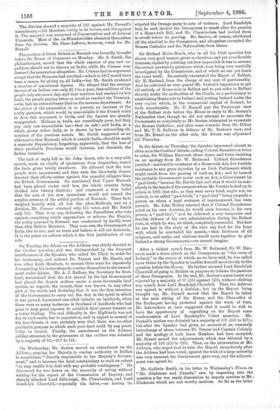The task of reply fell to Sir John G-orst, who
in a very able speech, made up chiefly of quotations from despatches, stated the facts given briefly elsewhere. He affirmed that the true people were acquiescent, and that even the disorderly classes directed their efforts rather against the peaceful villagers than the British Government. He mentioned that Upper Barmah had been placed under civil law, the whole country being divided into twenty districts ; and expressed a firm belief that the cost of the new operations would not exceed the surplus revenue of the settled portion of Burmah. These facts weighed heavily with all but the ultra-Radicals, and on a division, Mr. Cremer obtained only 125 votes, and Mr. Smith only 126. That is to say, deducting the Parnellites, who vote against everything which aggrandises or relieves the Empire, the policy pursued in But mah was condemned by hardly more than fifty British Members. That vote sets the Government of India free to act ; and we trust and believe it will act decisively. It is the peace we enforce which is the first justification of our rule.


































 Previous page
Previous page